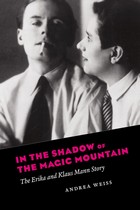2 books about Women authors, German

In the Shadow of the Magic Mountain
The Erika and Klaus Mann Story
Andrea Weiss
University of Chicago Press, 2008
A biography of Thomas Mann's two eldest children that provides intriguing insight into both their lives and the political and cultural shifts at the same time.
Thomas Mann’s two eldest children, Erika and Klaus, were unconventional, rebellious, and fiercely devoted to each other. Empowered by their close bond, they espoused vehemently anti-Nazi views in a Europe swept up in fascism and were openly, even defiantly, gay in an age of secrecy and repression. Although their father’s fame has unfairly overshadowed their legacy, Erika and Klaus were serious authors, performance artists before the medium existed, and political visionaries whose searing essays and lectures are still relevant today. And, as Andrea Weiss reveals in this dual biography, their story offers a fascinating view of the literary and intellectual life, political turmoil, and shifting sexual mores of their times.
In the Shadow of the Magic Mountain begins with an account of the make-believe world the Manns created together as children—an early sign of their talents as well as the intensity of their relationship. Weiss documents the lifelong artistic collaboration that followed, showing how, as the Nazis took power, Erika and Klaus infused their work with a shared sense of political commitment. Their views earned them exile, and after escaping Germany they eventually moved to the United States, where both served as members of the U.S. armed forces. Abroad, they enjoyed a wide circle of famous friends, including Andre Gide, Christopher Isherwood, Jean Cocteau, and W. H. Auden, whom Erika married in 1935. But the demands of life in exile, Klaus’s heroin addiction, and Erika’s new allegiance to their father strained their mutual devotion, and in 1949 Klaus committed suicide.
Beautiful never-before-seen photographs illustrate Weiss’s riveting tale of two brave nonconformists whose dramatic lives open up new perspectives on the history of the twentieth century.
Thomas Mann’s two eldest children, Erika and Klaus, were unconventional, rebellious, and fiercely devoted to each other. Empowered by their close bond, they espoused vehemently anti-Nazi views in a Europe swept up in fascism and were openly, even defiantly, gay in an age of secrecy and repression. Although their father’s fame has unfairly overshadowed their legacy, Erika and Klaus were serious authors, performance artists before the medium existed, and political visionaries whose searing essays and lectures are still relevant today. And, as Andrea Weiss reveals in this dual biography, their story offers a fascinating view of the literary and intellectual life, political turmoil, and shifting sexual mores of their times.
In the Shadow of the Magic Mountain begins with an account of the make-believe world the Manns created together as children—an early sign of their talents as well as the intensity of their relationship. Weiss documents the lifelong artistic collaboration that followed, showing how, as the Nazis took power, Erika and Klaus infused their work with a shared sense of political commitment. Their views earned them exile, and after escaping Germany they eventually moved to the United States, where both served as members of the U.S. armed forces. Abroad, they enjoyed a wide circle of famous friends, including Andre Gide, Christopher Isherwood, Jean Cocteau, and W. H. Auden, whom Erika married in 1935. But the demands of life in exile, Klaus’s heroin addiction, and Erika’s new allegiance to their father strained their mutual devotion, and in 1949 Klaus committed suicide.
Beautiful never-before-seen photographs illustrate Weiss’s riveting tale of two brave nonconformists whose dramatic lives open up new perspectives on the history of the twentieth century.
[more]

She Came from Mariupol
Natascha Wodin
Michigan State University Press, 2022
WINNER OF THE 2017 LEIPZIG BOOK FAIR PRIZE—When Natascha Wodin’s mother died, Natascha was only ten years old—too young to find out what her mother had experienced during World War II. All the little girl knew was that they were detritus, human debris left over from the war. Years later, Natascha set out on a quest to find out what happened to her mother during that time. Why had they lived in a camp for “displaced persons”? Where did her mother come from? What had she experienced? The one thing she knew is that her parents had to leave Mariupol in Ukraine for Germany as part of the Nazi forced labor program in 1943. Armed with this limited knowledge, Natascha resolved to piece together the puzzle of her family’s past. The result is a highly praised, beautiful piece of prose that has drawn comparisons to W. G. Sebald in its approach. Like Sebald, Natascha’s aim is to reclaim the stories of those who can no longer speak for themselves. The author is not only in search of her own family’s history, but she is also aware that she is charting unmarked territory: accounts of the plight of forced laborers and displaced persons are still a rarity within literature about World War II and its atrocities. Natascha’s personal homage to her mother’s life story is an important lyrical memorial for the thousands of Eastern Europeans who were forced to leave their homes and work in Germany during the war, and a moving reflection of the plight of displaced peoples throughout the ages. This is a darkly radiant account of one person’s fate, developing momentous emotive power—its subject serves as a proxy for the fate of millions.
[more]
READERS
Browse our collection.
PUBLISHERS
See BiblioVault's publisher services.
STUDENT SERVICES
Files for college accessibility offices.
UChicago Accessibility Resources
home | accessibility | search | about | contact us
BiblioVault ® 2001 - 2024
The University of Chicago Press









